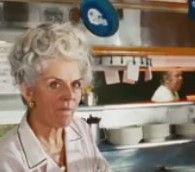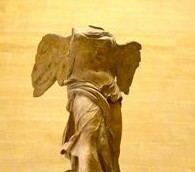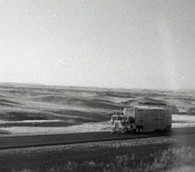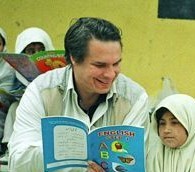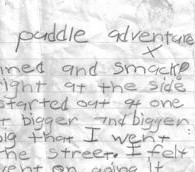Tag: Why We Travel
Travel Morality Tales
by Tom Swick | 09.13.10 | 10:54 AM ET
Parsing the hidden travel advice in two DirecTV commercials
Rats, Exploration and the Benefits of Travel
by Jim Benning | 08.27.10 | 2:48 PM ET
This passage in a New York Times story about the downsides of frequent exposure to information and entertainment on mobile devices caught my eye:
At the University of California, San Francisco, scientists have found that when rats have a new experience, like exploring an unfamiliar area, their brains show new patterns of activity. But only when the rats take a break from their exploration do they process those patterns in a way that seems to create a persistent memory of the experience.
The researchers suspect that the findings also apply to how humans learn.
Sounds to me like the perfect day of travel away from the rat race: exploring an unfamiliar place, followed by some good downtime in the evening.
As if you needed another reason to travel, right?
‘Everything was Richly, Gloriously Strange’
by Eva Holland | 08.18.10 | 2:09 PM ET
Thirty years later, Guardian writer Peter Bradshaw looks back on a youthful European tour he took as winner of an essay contest. It’s a good read:
There was no listening to iPods or iPhones - even the Sony Walkman was years away from being commonplace - and no tearful texting our mums from our mobiles. We didn’t tweet and we didn’t upload loads of digital pictures to our Facebook pages. We were going abroad, cut off utterly by the Channel, taking pictures with Kodak instamatic cameras that would take a month to develop. There was no nonsense about making sure we didn’t get dehydrated, or giving us water bottles etc. We just sweated southward through Europe in those non-aircon coaches, got out, did some sightseeing and partied after-hours in our hotel-rooms—although using the word “party” as an intransitive verb was something else no one did in 1980.
The Shrink-Wrapped Traveler
by Eric Weiner | 08.18.10 | 10:23 AM ET
Welcome to the Buddha Zen hotel, where the options are few and the travelers are happy
Victory at the Louvre
by Erin Byrne | 08.11.10 | 10:50 AM ET
Erin Byrne never let her mask slip, until a headless, armless Greek statue taught her a lesson she couldn't ignore
Ode to the Summer Vacation
by Terry Ward | 08.09.10 | 7:30 AM ET
The sun. The sand. The improvised Taco Bell sing-alongs. Terry Ward revels in the power of her family's long ago trips to the Outer Banks.
Daisann McLane: Gem Dealer, Jazz Singer, Archaeologist?
by Eva Holland | 08.06.10 | 1:13 PM ET
In her latest column in National Geographic Traveler, the World Hum contributor spills on a secret travel habit of hers: lying. Here’s McLane:
I wasn’t always so footloose with the facts. For a very long time, the only travel lie that crossed my lips was the one that is necessary in every traveling woman’s toolkit: “I’m married.” However, when I began to travel to more off-the-map destinations, I started prevaricating about my profession for security reasons: In many nations, identifying yourself as a journalist, even when not working as one, is tantamount to putting a big sign on your back that says, “Take me to the nearest police station now.”
One lie, two lies, and soon I was tumbling down the rabbit hole. The next thing I knew, I was in a café in Salvador, Brazil, drinking a caipirinha and telling the owner I was an ex-jazz singer who’d come looking for a school teaching the martial art capoeira. Disconnected from my everyday self, I exhilarated in the freedom of trying on new lives, new personae.
What it Means to Travel Back to the Future
by Michael Yessis | 08.06.10 | 12:21 PM ET
Another great piece by Peter Jon Lindberg, who returns to London and a pub he called home 20 years ago. He finds “not the workaday tavern of memory but a roomful of attractive people sipping Pinot Grigio” and lingers for “12 uncomfortable minutes.” Among his findings:
Good Lord, listen to me. I’ve become a bad novel: Aging crank revisits lost youth; cue strings, bittersweet regret. Forgive my maudlin self-indulgence. (If it’s any excuse, I just turned 40.) But really, what on earth did I expect? Only a child—a 20-year-old—could have wished London not to evolve, not to grow up.
Of course, this isn’t just about London, is it? It’s about the feeling any traveler has returning to a place he once knew as well as any: A city that seems to hold you in it, or some earlier incarnation of yourself. Going back, you become again that long-ago person, even while the city changes utterly around you. As it is I’ve spent most of my post-London life in New York, 5,000-odd days of it, such that I’ve scarcely noticed the incremental, wholesale transformation of Manhattan over the past 15 years. Yet an Englishman returning here after a decade away might feel the same about New York as I do about London: that it looks like an artist’s rendering; that “it’s all about money now”; that glamour has eclipsed grit, and something has been lost in the process; that the city no longer belongs to me, but to other, younger, wealthier, more exciting people.
Dear Gumbo: ‘You Haunt Me’
by Eva Holland | 08.04.10 | 3:46 PM ET
Intelligent Travel’s Aimee Brown, currently traveling on the Gulf Coast, has an open letter to the Louisiana stand-by. Here’s a sample:
I find you rich with a depth that speaks to an unknown source. You haunt me. I taste in you hope and fear. There is darkness in your roux, and your scent suggests all that Louisiana is. Lust, love, dark alleys, open arms, bayous that hold within them hidden threats of danger and beauty.
Made of simple ingredients—shrimp, crab, crawfish, and spices—you are more than the sum of your parts. You are formed by the hands of people who belong to this place. Because of that so do you.
Time Makes ‘The Case Against Summer Vacation’
by Michael Yessis | 07.29.10 | 12:11 PM ET
David Von Drehle’s argument focuses on summer break for students, but touches on the educational value of travel:
Deprived of healthy stimulation, millions of low-income kids lose a significant amount of what they learn during the school year. Call it “summer learning loss,” as the academics do, or “the summer slide,” but by any name summer is among the most pernicious—if least acknowledged—causes of achievement gaps in America’s schools. Children with access to high-quality experiences can exercise their minds and bodies at sleep-away camp, on family vacations, in museums and libraries and enrichment classes. Meanwhile, children without resources languish on street corners or in front of glowing screens.
Pico Iyer: ‘The Trip That Changed my Life’
by Eva Holland | 07.20.10 | 1:49 PM ET
Over at Gadling, Pico Iyer looks back, thoughtfully and lyrically as always, at his first trip to Thailand in 1983. Here’s a taste:
It wasn’t Thailand, of course, that was beckoning me, but all the force of the things I couldn’t make out. Night was day and late September was summer and men were women who became men again at dawn. The characters around me on the signs (the streets) were strange, and the language so tonal I couldn’t tell a player from a prayer. There were mirrors everywhere, in bars, hotels and what they gave me back to me was a figure I couldn’t recognize. I hadn’t realized ‘til that day that you travel to stumble into the unvisited corners of yourself.
Out the Airplane Window
by Peter Ferry | 07.20.10 | 12:59 PM ET
During flights, Peter Ferry isn't quick to pull down the window shade or watch a bad movie. Here's why.
Museums: ‘A Different Sort of Inspiration’
by Eva Holland | 07.19.10 | 5:42 PM ET
World Hum contributor Julia Ross ponders the connections between museums and their cities. On her favorites, she writes:
They’re an intrinsic part of travel for me, and the ones I love most distill the mood or aesthetic of a city in a way I can’t grasp walking the streets. It’s about more than art. It can be in the light, the design, or how the viewing public behaves. Something about the culture is captured.
Taking the Greyhound to America
by Sophia Dembling | 07.16.10 | 10:26 AM ET
Sophia Dembling mines the archive of the cross-country journeys that changed her life
See the full audio slideshow: »
TBEX ’10 Revisited: Seven Quotations on Writing and Travel
by Jim Benning | 07.01.10 | 11:43 AM ET
I gave a talk last weekend at the Travel Blog Exchange conference in New York on travel writing and the story of World Hum. At the end of it, I shared several of my favorite quotations that I think help explain why so many of us are drawn to traveling and telling stories about our travels.
Several people have asked for them, so without further delay, here they are:
- “There have been great societies that did not use the wheel, but there have been no societies that did not tell stories.”—Ursula K. LeGuin
- “To be a person is to have a story to tell.”—Isak Dinesen
- “Stories are the creative conversion of life itself into a more powerful, clearer, more meaningful experience. They are the currency of human contact.”—Robert McKee
- “I write entirely to find out what I’m thinking, what I’m looking at, what I see and what it means.”—Joan Didion
- “If stories come to you, care for them. And learn to give them away where they are needed. Sometimes a person needs a story more than food to stay alive.”—Barry Lopez
- “Travel does what good novelists also do to the life of everyday, placing it like a picture in a frame or a gem in its setting, so that the intrinsic qualities are made more clear. Travel does this with the very stuff that everyday life is made of, giving to it the sharp contour and meaning of art.”—Freya Stark
- “To my mind, the greatest reward and luxury of travel is to be able to experience everyday things as if for the first time, to be in a position in which almost nothing is so familiar it is taken for granted.”—Bill Bryson
Daisann McLane: ‘Movies and Travel Make a Great Match’
by Eva Holland | 06.30.10 | 2:46 PM ET
If you’re anything like me, you’ve probably heard it before: “Why are you wasting time in a movie theater when you should be out sampling the local culture?” World Hum contributor Daisann McLane has an articulate and convincing answer—which, yes, I’ll be cribbing from in future conversations with my fellow travelers. Here’s McLane on movie-going on the road:
When I first began to travel, I craved experiences that were totally different from what I already knew. But as I got more mileage under my belt, I discovered it was more interesting to follow my regular routines and see how my familiar furniture was rearranged by being in another place. When I travel by myself, I steer myself to places and activities I enjoy anyway, such as movies, and wait. Some of the most interesting experiences I’ve had have been watching films “out of context.”
The Science of Vacations: ‘Length Isn’t Terribly Important’
by Michael Yessis | 06.25.10 | 4:23 PM ET
Scientific research about vacationers has revealed some fascinating insights. From a piece in the Boston Globe:
For psychologists and behavioral economists, vacations are a window into the still only dimly understood mystery of human pleasure, a field known as hedonic psychology. Their research, along with other work on prototypically pleasant (and unpleasant) experiences, has begun to yield a portrait of your mind on vacation. And if the findings tell us anything, it’s that we might actually need some help. When we guess the best way to spend our free time, it seems that we often guess wrong.
Thanks for the tip Rob Verger.
Interview With Greg Mortenson: One Traveler Changing Lives
by David Frey | 06.04.10 | 10:46 AM ET
David Frey asks the bestselling author about the "Three Cups of Tea" approach to travel and life
Tales of a Second Grade Traveler
by Julia Ross | 06.01.10 | 10:55 AM ET
Is it possible to pinpoint the moment a girl becomes a traveler? Julia Ross thinks so.
Interview With Amanda Pressner: A Year of Getting Lost
by Michael Yessis | 05.27.10 | 12:26 PM ET
Michael Yessis talks to one of the authors of "The Lost Girls" about long-term travel and its unforeseen rewards
